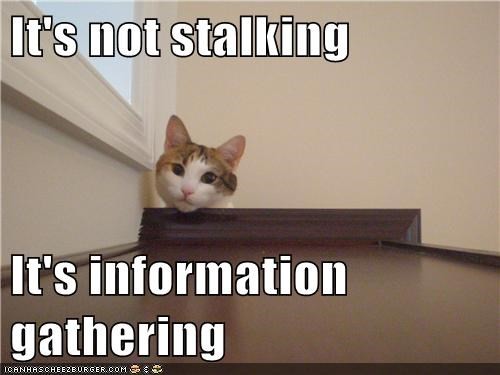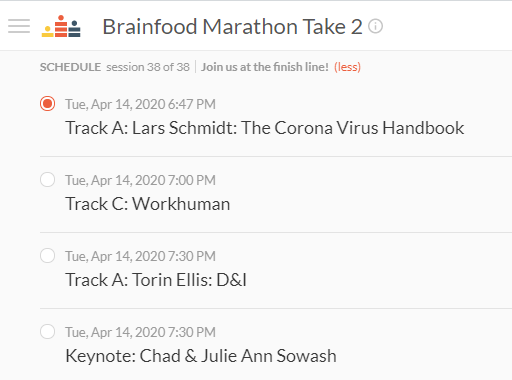Curiosity killed the cat, and grew the recruiter - Part I
I’m back to posting with some sort of regularity and today we’re going to talk about the thing that helped me the most as a recruiter: learning from others.
Obviously, I'll tell you how I did that, but I'm also going to simplify the process for you by sharing a bunch of interesting people to follow with you.
Recruitment is a curiosity game.
When I started as a recruiter I was hiring recruiters for Google, and they all needed to have Boolean search and x-ray sourcing experience. Now, in 2020, that’s the core of sourcing, it’s a far cry from earth-shattering skills, but back in 2010-2011, it was.
I figured that if the Google recruiters needed these skills, so did I. So I started doing some research on the internet and I found Boolean black belt, Irina Shamaeva, and a bunch of groups on LinkedIn (yes, LinkedIn groups were a thing back in the days). And they all showed me some super complicated stuff like: site:linkedin.com -inurl:company -inurl:jobs -inurl:dir (sales | “business development” | “new business”) French (Dublin | Ireland) -director
So I tried to copy that template to find my own candidates. Except it didn’t work. All the resources that I had been coming across were from the US… Do you see why I wasn’t getting any suitable candidate?
So I asked the senior IT recruiter in my company: can you teach me “Boolean search”? Sure he said, it’s just AND and OR in capital letters.
But hum, what about the coding bits that I found online, the straight lines (pipes), and the -inurl:dir…
That’s where my research stopped internally.
So what next? I really needed to find these trilingual English, Turkish and Hebrew speakers with a bachelor’s degree.
Well, I kept searching until I came across Social Talent. OMG an actual sourcing training in Dublin, IRELAND! Mind blown!
Fast forward the 10 months that it took me to convince my manager that spending money on that boot camp would be money well spent (it was, I made 10 placements in the 6 weeks following the training) and I learnt about Ven diagrams, URL manipulation, x-raying LinkedIn through Google and a bunch of other stuff that blew my mind. So as one would, I started following Johnny Campbell and Holly Fawcett (the great trouble-shooter of my Boolean strings – I want people in Sofia, Bulgaria, not all the Sofia based in Bulgaria) on LinkedIn, and on Twitter. No, I’m not a stalker, it’s called information and it’s available publicly.
And then the scope of my recruitment network grew.
Holly replied to that dude on Twitter and the thread was interesting. Let’s follow said dude. Dude engaged in an interesting recruitment thread with someone else. Let’s follow that someone else, and so on.
 And all these people were sharing articles, blog posts, insights, tools, Chrome extensions about recruitment. Honestly, the days I was getting a seat during my commute were the days my colleagues were getting 10 links of stuff to read about recruitment.
And all these people were sharing articles, blog posts, insights, tools, Chrome extensions about recruitment. Honestly, the days I was getting a seat during my commute were the days my colleagues were getting 10 links of stuff to read about recruitment.
So sure, a lot of these recruitment experts were in the US, but as time went by, we got more and more in Europe, France and Germany have a really strong base (I don’t speak German, I use Google Translate; be crafty people!).
Honestly, if you want to grow as a recruiter, you’re going to do it through learning from other recruiters or industry experts. Follow people online if you don’t have the budget to go to SourceCon (or if there's a global pandemic going on), go to recruitment meetups (DBR for in-house recruiters, RTT for everyone), try to engage and add value.
If like me you have impostor syndrome because you’re a full-cycle recruiter and you’ve never had the time to learn Python or to spend 2 hours automating something, it’s ok. Start small. I like to think that my articles are helping a couple of people, and when I go to a meetup and I show a junior recruiter how to build a Boolean string for the 1st time, I hope it’s going to help them in their career as much as it helped me.
But let’s face it, when I hang-out with super technical sourcers, I limit myself to asking questions and showing gratitude for the insights they’re sharing with me.
So if you want to follow the people who are super technical, who crack the new LinkedIn algorithms and build data scrapers, start with Tris Revill (@trisrevill and his Growth Hacking group on Facebook), Guillaume Alexandre (@Mr_Sourcing on Twitter) and Mark Lundgren (every time I've met him, I left with recommendations for 2 new tools).
David Sankar is also really interesting to follow. You can join Le Cercle Des Recruteurs Disparus (@LCDRD_ on Twitter), loads of useful stuff on their shared Trello.
If you haven’t subscribed to Hung Lee’s Recruiting Brainfood weekly newsletter, that’s because you’re like me: 5 of your contacts share the link every week. But hey, do subscribe, it’s nice to get it delivered in your inbox and you can join the Facebook Group.
Early in April, Hung organised a marathon, and it was amazing. At the beginning of the COVID-19 crisis, when I was feeling a bit lost and wondering how I could add value in my role, the marathon, really gave me the boost I needed and plenty more relevant people to follow. To name but a few: Heather E. McGowan, the talk she gave on Adaptation was an eye-opener. I missed Lars Schmidt’s talk on the Coronavirus Handbook (sue me, I was cooking dinner) and no matter which Crowdcast link I click on, I can’t find the track. Martyn Redstone, and the usual suspects: Bill Boorman, Google Dave Hazlehurst, Greg Savage, Jerome Ternynck.

And last but not least on this list, William Tincup and his Recruiting Daily. Check out his HRTX Virtual training event on May 28th.
I could go on and on...
When I started preparing for this article I realise that 90% of the people I follow on Twitter talk about recruitment in one shape or another. Some are super technical, some are serious, some focus on candidates, some provide comic relief when it’s hard to be a recruiter, some focus on hiring managers and adding value to the company. They all are really interesting to follow, but this article would be the length of “Gone with the wind” if I kept on describing why I enjoy following them. DM me and I’ll share my list with you if you’re interested.


